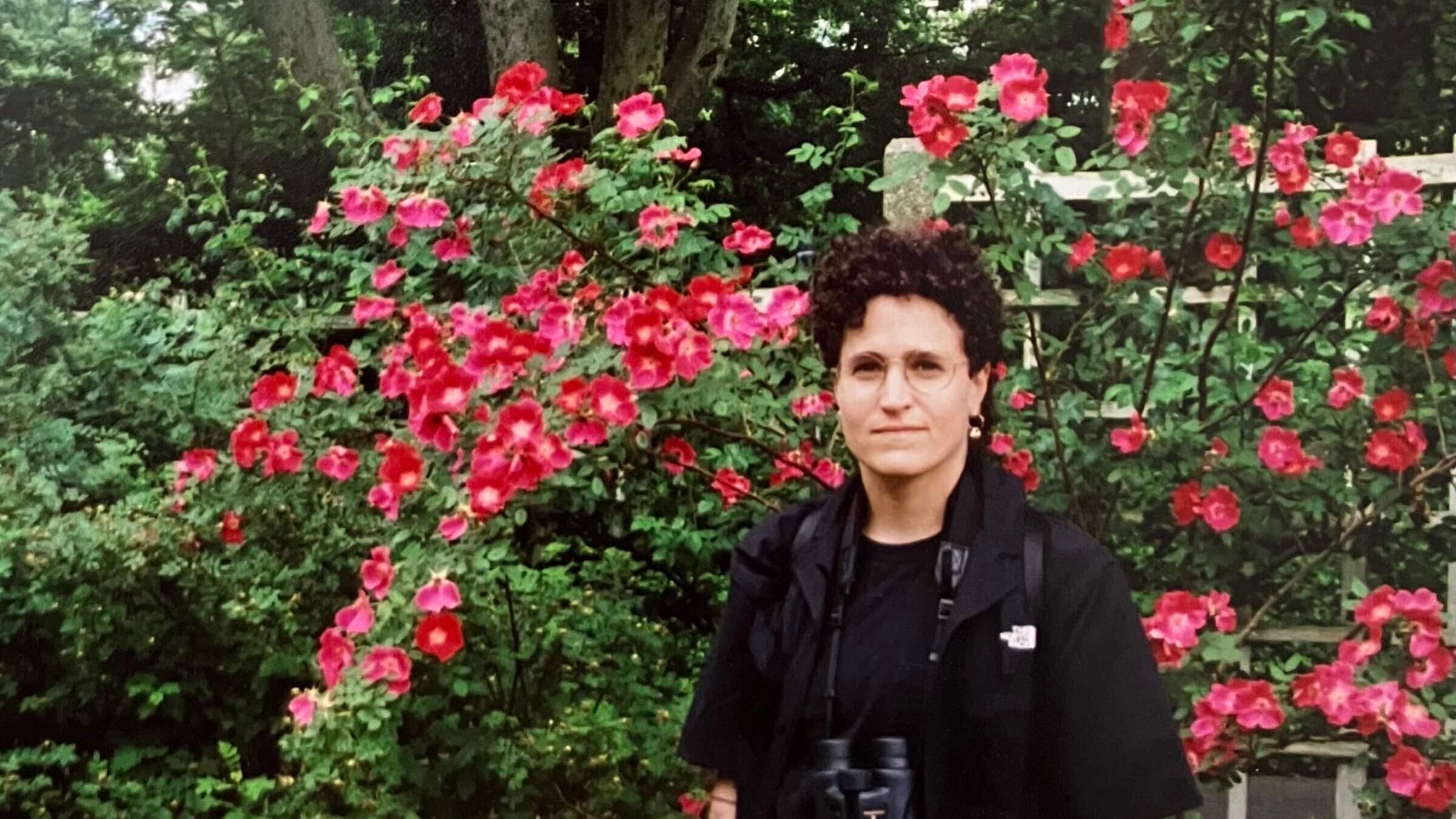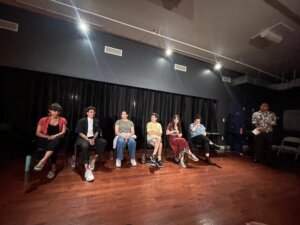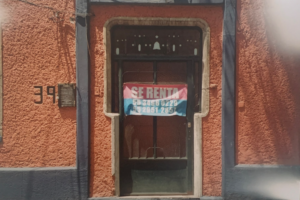Preserving Mexican Syrian Jewish traditions in a world on the verge of collapse
Playwright Clairette Atri Mizrahi wants to rejuvenate a shuttered café and her grandmother’s cooking

Clairette Atri Mizrahi, is the author of Nunca estás y estás. Courtesy of Clairette Atri Mizrahi
Whenever Clairette Atri Mizrahi constructs a thought, you can see the joyous, rigorous fervor in her. She has the sort of zeal for language that is the unmistakable stamp of a writer. A poet, playwright, and scholar, she traces her creative instinct back to her youth.
“I think I was writing poetry, but I never named it that – I didn’t have the words,” she told me. “At some point, somebody told me, ‘Yeah, you write poetry.’”
Currently a PhD candidate in a Psychology program at CUNY, Atri Mizrahi, 38, is the author of Nunca estás y estás, a play that was selected for this year’s Cimientos, a play development program at IATI, an East Village-based bilingual theater that was founded in 1968. She began working on the play at NYU in 2018.
“I just had to write it,” she said. “I just wrote what I had — right next to me, you know? Like, that world that is both Arab and Jewish. That ambivalent mother love and grandmother love, and all this woman love that is both loving and full of possibilities and painful, and at the core of the wound.”
A nonlinear, lyrical work, the play is set entirely on a Friday afternoon, as a Mexican Syrian Jewish mother seeks to prepare Shabbat dinner while the threat of an earthquake is imminent. This anticipation and fear of collapse is both literal and metaphorical. Atri Mizrahi said she “wanted to show this particular world in Mexico City, where there is always a threat of an earthquake, of a collapse, and ask: What is about to collapse?”
Through the two women at the center of the play, called Mayor and Menor, Atri Mizrahi subverts conventions of character. The actors inhabiting the roles must seamlessly move between the conversations that occur between a mother and a daughter and those of two lovers. She described this as an “experiment” in attempting to “modify what we know about the mother preparing Shabbat dinner with her two kids,” asking “What would it tell us about that mother figure that we would otherwise just see in her domestic duties?”
‘I didn’t relate to what was termed Jewish’
Rejection of binary identity is intrinsic to Atri Mizrahi’s work, because it’s at the heart of her own lived experience. She grew up and went to college in Mexico City, and is the daughter of two Syrian Jewish parents. Her maternal grandmother was born in Beirut and arrived in Mexico with her family in 1959.
Perhaps unsurprisingly, she feels ambivalent about labels. She grew up, she said, “surrounded by Arabness.”

“I knew I didn’t relate to what was termed Jewish. I have a hard time with that umbrella term because it is more than often not me; it is a white, European Jew,” she told me. She adds she came to the realization that she was an Arab Jew relatively recently, because “in Mexico, it was not a contradiction to be Jewish and Arab.”
Throughout our conversation, she stressed that her task — particularly in the context of writing plays — is not that of representation, but, instead, “trying to enact this world that is still here, and has been so threatening and threatened since the dichotomization of the Arab and the Jew.”
With “second-generation Arab Jews passing away,” Atri Mizrahi believes that all of her work “lies within the tension” she experiences “between grasping to keep this world and trusting that this world will always be there, emerging.”
Atri Mizrahi describes the world she grew up in as one “that is, in a way, before and beyond Zionism, and that is threatened by nationalist projects, by colonial projects, by Zionism, by Arab nationalism,” though, she contests, “it can never be taken away from us, because here it is present. I see it when I go to my grandmother’s house.”
A place for drifters and wanderers
As Atri Mizrahi worked to revise her play this year, she was also cooking many of her grandmother’s recipes, which inspired her to center the play around jamud batata, or la comida de los viernes — a dish that is made in Mexican Syrian Jewish homes every Friday. It’s a broth with ingredients such as potato, lime, celery, onion and parsley, which is eaten alongside rice, vermicelli and peas.
Atri Mizrahi also recalls her grandmother “making kibbes with her hands,” describing the preparation of the Lebanese Syrian meat pockets as “a powerful and erotic gesture.”
Her grandmother’s cooking has even made its way into her scholarship, in which Atri Mizrahi is offering the notion of a dissertation as a place — specifically, Café Guanajuato, whcih was open from the ‘30s through the ‘70s, where Syrian Jewish men in Mexico City played taaule (backgammon).

Located in Colonia Roma, which has today become significantly gentrified thanks in large part to a high concentration of transplants and tourists from the US, Atri Mizrahi learned about the café, when she walked past it with a friend, who informed her of its history. They noticed a bright orange “For Rent” sign in front of it.
In speaking to her neighbors, who had lived near Café Guanajuato when it was still in business, the refrain she continuously heard was “that it was a place for drifters or wanderers.” This resonated for Atri Mizrahi who had discovered the building while wandering, something she connects to the idea of the Wandering Jew, which she likens to the Arab Jewish experience.
“The modern state of Israel presents itself as the ingathering of Jews, as the end to that wandering,” she told me, adding that the opposite was true for Jews of the Ottoman Empire whose wandering “was a result of this nation-state of Israel — this political project and Zionism, because we were uprooted from those lands where we had been for 2,000 years.”
The process of reopening Café Guanajuato has ignited questions within Atri Mizrahi about the distinction between being “not allowed” versus “left out.” Atri Mizrahi herself would not have been welcome at the original Café Guanajuato; only men were allowed. She envisions a new Café Guanajuato as an intergenerational community center, one where there will be readings and performances, and kibbes will be served.
“I think it would be beautiful to serve my grandmother’s food, and have, like, a workshop of how to do kibbes,” she said.
Atri Mizrahi is inspired by the possibility of producing Nunca estás y estás as a component of her dissertation, or at Café Guanajuato itself. The creative act, it seems, is her way of holding on to a world that is increasingly vulnerable, but gently enough that it is able to “proliferate” — a refrain to which she regularly and emphatically returned in our conversation. “If worlds can be made and formed through this work, and through – then that – that is more radical than pointing out and criticizing — for me.” She asserts, “It’s a way of resisting — by doing, and by inhabiting this world.”
A message from our Publisher & CEO Rachel Fishman Feddersen

I hope you appreciated this article. Before you go, I’d like to ask you to please support the Forward’s award-winning, nonprofit journalism so that we can be prepared for whatever news 2025 brings.
At a time when other newsrooms are closing or cutting back, the Forward has removed its paywall and invested additional resources to report on the ground from Israel and around the U.S. on the impact of the war, rising antisemitism and polarized discourse.
Readers like you make it all possible. Support our work by becoming a Forward Member and connect with our journalism and your community.
— Rachel Fishman Feddersen, Publisher and CEO





























